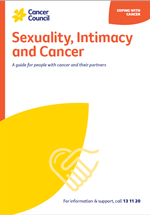- Home
- About Cancer
- Managing side effects
- Sexuality, intimacy and cancer
- Overcoming specific challenges
- Changes in appearance
Changes in appearance
If the way your body looks has changed after cancer treatment, you may feel self-conscious. It’s common to feel a range of emotions about the physical changes caused by treatment, which may include: changes to body functions; removal of a body part and use of a prosthesis; having a stoma; loss of hair from the head and body; weight loss or weight gain; skin rashes; swelling of part of the body (lymphoedema); and scars.
Some cancers of the head and neck can cause significant changes to what you look like, how you speak and how you eat or breathe. This can be upsetting because the change is visible, and kissing, speech and eating may be affected.
The way you look may affect how you feel about yourself. Changes to your face or body may make you feel less attractive, and this can affect your sexual confidence, self-esteem and body image. Often people find that their partner (or a potential partner) isn’t as concerned about these changes as they are. You may worry about other people’s reactions to you, or worry that they will avoid or reject you when they see how your body has changed.
It takes time to adjust to changes in appearance. Some physical changes may improve with time, while others may be more long-lasting. Focus on yourself as a whole person and not just the part that has changed.
Look Good Feel Better program
This free 2-hour program teaches adults and teens how to use skin care, hats and wigs to help restore appearance and self-esteem during and after treatment. Visit Look Good Feel Better to book into a workshop. They can also send you a confidence kit if you can’t attend in person.
Tips for adjusting to appearance changes
- Remember that sexual attraction is based on a mix of emotional and physical factors, not on a body part or physical characteristic.
- Look and touch your scars to get used to the changes.
- Use clothing, make-up or accessories that make you feel good or highlight your favourite features.
- Consider showing your partner any body changes before sex – and talk through what feels okay. Having your partner look at and touch these areas may help both of you get more comfortable with the changes.
- If you feel uncomfortable about a part of your body, you can wear clothes to cover it during sex – e.g. if you have had breast surgery you may choose to wear a camisole. You may also prefer to avoid sexual positions that leave the area exposed.
- Look at and touch your scars so you get used to the changes.
- Dim the lights or light candles when you have sex until you feel more confident about your body.
- If your hair has fallen out, you can wear a hat, wig or scarf, or you may prefer to leave your head uncovered. See Hair Loss or call 13 11 20 for a wig service in your area.
- If you have concerns about weight loss or gain, choose well-fitting clothes. Something too tight or too baggy may highlight weight changes. Consider treating yourself to a new outfit that makes you feel comfortable.
- Ask your doctor about the possibility of plastic surgery or a facial prosthesis if surgery or radiation therapy has affected your face. This may help you regain a more natural appearance and help with any changes in the way you speak.
- See a counsellor to help you just to the changes.
My sexual partner has always wanted to have sex with me – this made me feel good about myself after my surgery and when my head was shaved. He didn’t care – he just loved my body anyway.
Daphna
→ READ MORE: Removal of a body part
Podcast: Sex and Cancer
Listen to more of our podcast for people affected by cancer
More resources
Dr Margaret McGrath, Head of Discipline: Occupational Therapy, Sydney School of Health Sciences, The University of Sydney, NSW; Yvette Adams, Consumer; Dr Kimberley Allison, Out with Cancer study, Western Sydney University, NSW; Andreea Ardeleanu, Mental Health Accredited Social Worker, Cancer Counselling Service, Canberra Health Service, ACT; Kate Barber, 13 11 20 Consultant, Cancer Council Victoria; Dr Kerrie Clover, Senior Clinical Psychologist, Psycho-Oncology Service, Calvary Mater Newcastle, NSW; Maree Grier, Senior Clinical Psychologist, Royal Brisbane and Women’s Hospital, QLD; Mark Jenkin, Consumer; Bronwyn Jennings, Gynaecology Oncology Clinical Nurse Consultant, Mater Health, QLD; Dr Rosalie Power, Out with Cancer study, Western Sydney University, NSW; Dr Margaret Redelman OAM, Medical Practitioner and Clinical Psychosexual Therapist, Sydney, NSW; Kerry Santoro, Prostate Cancer Specialist Nurse Consultant, Southern Adelaide Local Health Network, SA; Simone Sheridan, Sexual Health Nurse Consultant, Sexual Health Services – Austin Health, Royal Talbot Rehabilitation Centre, VIC; Prof Jane Ussher, Chair, Women’s Heath Psychology and Chief Investigator, Out with Cancer study, Western Sydney University, NSW; Paula Watt, Clinical Psychologist, WOMEN Centre, WA.
View the Cancer Council NSW editorial policy.
View all publications or call 13 11 20 for free printed copies.
Need to talk?
Support services
Coping with cancer?
Speak to a health professional or to someone who has been there, or find a support group or forum
Life after cancer treatment
Webinars, exercise and nutrition, sexuality programs, and back-to-work support
Cancer information
Your coping toolbox
Strategies for managing difficult situations during and after cancer treatment
View our publications
Guides and fact sheets for people with cancer, their families and friends

